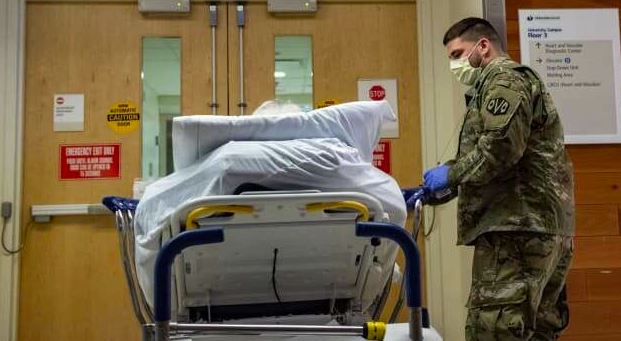Omicron Spread: US President Deploys Military Medical Teams to Hospitals in 6 States
LAHORE MIRROR (Monitoring Desk)– President Joe Biden on Thursday will announce the deployment of six teams of military medical personnel to overwhelmed hospitals in New York, New Jersey, Ohio, Rhode Island, Michigan and New Mexico, a White House official said.
The deployments come as hospitals grapple with staffing shortages as nurses and other medical personnel call out sick from omicron amid a surge of patients infected with the highly contagious variant.
The U.S. reported almost 900,000 new infections on Wednesday, bringing the seven-day average to more than 786,000 new cases per day — a pandemic record and a 37% increase over the previous week, according to a CNBC analysis of data compiled by Johns Hopkins University.
An average of more than 1,000 hospitals nationwide are currently reporting critical staffing shortages, according to HHS data. However, it’s likely an undercount because many hospitals were not reporting their status as of Wednesday.
Dr. Gillian Schmitz, president of the American College of Emergency Physicians, said the strain on front-line workers is worse now than at any other point in the pandemic.
“Many places across the country are getting to the point where even their backup staff are getting sick,” Schmitz told CNBC Wednesday. “Pretty much the whole country right now is feeling this surge of cases that is impacting staffing.”
Biden announced his plan to deploy 1,000 military medical personnel to support hospitals in December as omicron was rapidly overtaking the delta variant. The Federal Emergency Management Agency is also providing additional hospital bends and sending ambulances and EMS teams to help transport patients.
“It’s not enough,” Schmitz told CNBC Wednesday. “I know everyone is trying to support as best we can, but there are limited resources even within our national structure.”
Epidemiologists have warned that the sheer magnitude of omicron infections still threatens to overwhelm hospitals with patients, even if the variant is generally less severe than delta.
Infectious disease experts, in a study this week, found that omicron patients at Kaiser Permanente Southern California were 74% less likely to need intensive care and 91% less likely to die from the virus compared to people who caught the delta variant. None of the omicron patients required mechanical ventilation, according to the study.
The overall risk of hospitalizations was also 52% lower for omicron patients compared with people who had delta, according to the study. Hospital stays for omicron patients were also about three days shorter than than their delta counterparts.
Kaiser Permanente Southern California provides care to more than 4.7 million people. The study, which has not been peer reviewed yet, analyzed more than 52,000 omicron cases and nearly 17,000 delta cases.
Doctors and nurses have warned about staffing shortages for months. The American Nurses Association in September called on the Biden administration to declare the nursing shortage a national crisis.
“The nation’s health care delivery systems are overwhelmed, and nurses are tired and frustrated as this persistent pandemic rages on with no end in sight,” ANA President Ernest Grant said at the time. “Nurses alone cannot solve this longstanding issue and it is not our burden to carry,” Grant said.
Acting Food and Drug Administration Commissioner Dr. Janet Woodcock told lawmakers on Tuesday the U.S. must ensure hospitals and other essential services don’t break down as people call out sick.
“It’s hard to process what’s actually happening right now, which is most people are going to get Covid,” Woodcock testified before the Senate health committee on Tuesday. “What we need to do is make sure the hospitals can still function, transportation, other essential services are not disrupted while this happens.”
SOURCE: CNBC

